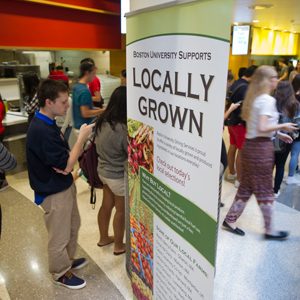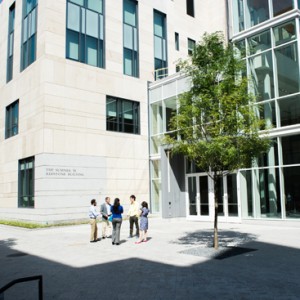Boston University is one of the most environmentally responsible colleges in the United States and Canada, according to the new edition of The Princeton Review’s Guide to 322 Green Colleges.
“In a few short years Boston University has made significant strides toward a sustainable future,” the authors write in the guide. “With its sustainability committee, four working groups, sustainability office, a one million dollar revolving fund, departments, student organizations, and nearly 400 courses related to sustainability, the university has developed an impressive sustainability program by any measure.”
The Princeton Review took note of BU’s green buildings and transportation and also drew attention to its retrofitting of existing buildings for energy efficiency through equipment, lighting and energy management systems, and window replacement projects.
Sustainability on campus has grown as a factor that influences school choice for students, and colleges across the country have responded in a variety of ways, from changes in individual lifestyles to a notable commitment to sustainability in academic offerings, environmentally related policies, and student activities. For the 2013 edition of its environmental guide, The Princeton Review profiled 322 US colleges it considers green leaders.
“We recognize there is a rising interest among students in attending colleges that practice, teach, and support environmentally responsible choices,” according to the guide. “Among the more than 7,000 college applicants The Princeton Review surveyed for its 2012 College Hopes & Worries Survey, 68 percent of respondents said they would value having information about a college’s commitment to the environment, reflecting a steady increase since we began asking this question in 2008.”
In its section on Boston University, The Princeton Review further wrote:
In 2011, BU became a member of the Founding Circle of the “Billion Dollar Green Challenge.” Buildings currently under construction will seek LEED certification or better, and there are already two LEED-certified buildings on campus. BU has increased its waste-diversion rate from four percent to 31 percent. Ninety-two percent of students arrive to campus by alternative means. The main campus is organized along one of Boston’s main thoroughfares, with nine subway stops, thirteen intercity bus lines, the BU Bus, and three other shuttle services serving the campuses. BU has an active ride share program and boasts the first bike lanes in Boston’s growing network, which now incorporates more than 100 miles of city streets and parks.
Other highlights include an award-winning website to engage the university community with a monthly sustainability challenge. To keep up the green pace, there are seventeen sustainable student organizations on campus, from BU Bikes to USGBC Students. BU’s green initiatives even extend to the university’s myriad dining halls. Efforts include 91 percent of the facilities running pre-consumer composting programs, sourcing cage-free eggs, and donating leftover baked goods to local meal programs, food pantries, and shelters.
“Colleges train the next generation of leaders who will ultimately be responsible for putting green ideas into practice,” the authors note. “By infusing sustainability principles into every aspect of higher education, there is a new priority for a whole generation of leaders, educated and trained, to make a greener world now.”
















































Right on BU… always on the forefront…and with a high five from Princeton! More and more folks recognize-in all arenas- what BU is doing and has done! Only wish SON was saved, another college way ahead of its time…there are always resurrections!
I was truly thrilled to read this story, and am honored to be a founding member of Sustainability@BU. Sustainability Director Dennis Carlberg is a wonderful leader. Keep up the fabulous work!